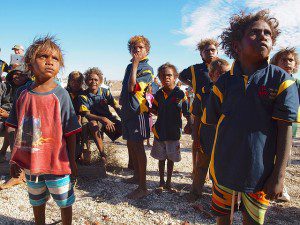Editors’ Note: This article is part of the Patheos Public Square on The Spirituality of Children. Read other perspectives here.
As the first shock jock, Jesus specialized in pricking the bubbles of the spiritually self-righteous. Once, the self-important apostles asked Jesus, “Who, then, is the greatest in the kingdom of heaven?” He called over a child and said: “Truly I tell you, unless you become like little children, you will never enter the kingdom of heaven.”
Was he simply deflating their egos or did he really mean it? If so, to what child qualities was he pointing? Here is my analysis.
1. Awe
The English translations of the Hebrew Scriptures, say, “the fear of the Lord is the beginning of wisdom.” This conjures up an image of craven humans cowering before a distant demanding deity, when, in fact, what is translated as, “fear” actually means, “awe.” We have the same expression in Swahili; if someone achieves something of note, friends will joyfully exclaim, “nakuogopa!” (literally, “I fear you!” but meaning, “I’m in awe at your accomplishment!”)
So, the first great gift of children is their sense of awe at all the experiences they are having. You can see it in the size of their eyes. Old eyes are squinted, beaten into submission by conventional propaganda; young eyes are wide open all the time.
And this, indeed, IS the beginning of wisdom.
2. Curiosity
The obvious response to awe is to seek answers to life’s miracles; so children pepper adults with questions. Some of these questions are so deep, that they are never asked by adults, thus appearing to be naive or cute.
Until age six, I lived with my grandparents and seven aunts/uncles. I was born in 1946, and I regularly heard table conversations about “the war.” One dinner time, I piped up and asked, “How long did the war last?” I’m thinking the response will be something like, “Well, it started at 8:15 AM and lasted until 5:45 PM.” When I heard that it had lasted six years, I was incredulous, so I asked other questions, each of which resulted in hilarious laughter from the adults:
“What happened when it got dark?!”
“And what happened when they had to go potty?!”
And the clincher – for a Catholic family:
“And what happened when it was mass time?!”
As a four-year-old, I could see that this particular emperor was stark naked, but the adults had already been marinated in the cultural trance.
3. Openness
Kids have to be taught prejudice. This was borne in upon me by an incident during my time in Kenya. One day a woman – whom nobody in the village knew or could trace – arrived and sat under the shade of a tree. She was obese, naked, disheveled and psychotic; and was nursing a six-month-old baby boy, who looked adoringly into her eyes while lovingly fingering her face, as satiated breast-feeding babies are wont to do.
In the child’s mind, this woman was God; and indeed she was. Like Christ’s Eucharist, she fed him from her own body and blood. But in the eyes of the world, this woman was crazy. Eventually, alas, this little boy would grow into the same realization – but he would have to be TAUGHT it.
4. Forgiving
Shortly after arriving in the US, in 1987, I saw a newspaper photo of an abusive mother of another six-month-old boy, whom she had used regularly as an ashtray to stub out her cigarettes. She was being led away in handcuffs while the little child was freaking out and desperately attempting to be reunited with her. He was more than willing to take her back.
5. Vulnerable
It’s hard to get more vulnerable than being naked, unable to stand, walk, talk; to be doubly incontinent and be told what and when to eat. Which is why we love children. Their vulnerability is their greatest asset. Jesus put it succinctly, “the meek shall inherit the Earth.”
6. Imaginative
This gift is always misunderstood. We think imagination is the ability to make up stuff that is not real. That ability is fantasy. Imagination is the ability to alter our state of consciousness, visit other dimensions, interact with energies and entities that reside there, learn from them and bring back the new perspectives and cross-fertilize them with “waking consciousness.”
Kids, poets, mystics and really great scientists know that this is the primary tool for understanding reality.
7. Resilient
The essence of this gift is working with the present moment. The tenacity and creativity of children in surviving horrible circumstances – holocaust camps, refugee camps, and street living – is nothing short of miraculous. No matter what level of technology you throw at them – cardboard cartons or sophisticated Lego, donkeys or bikes, pencils or iPads – they will instantly become experts at it. If only there were some way to unleash that on the political process.
8. Sense of Fairness
Even little kids have an innate sense of fairness and quickly spot the discrepancies, especially when authority figures do not walk their talk. One authority figure they frequently call to task is the Church-God, made in our image and likeness, who creates hell and limbo. As they grow, these kids don’t give up on God, they simply abandon the parody of God.
9. Access to Akasha
Under the scientific baton of Dr. Ian Stevenson of the University of Virginia, who personally investigated over 2,000 cases “suggestive of reincarnation”, the reality that kids can dip into the Akashic Records and access experiences from previous lifetimes, seems pretty well substantiated.
Is it any wonder, then, that the first eight child gifts mentioned above are available as they touch down on the tarmac of their current lifetime?
Conclusion
Babies arrive as warriors, storming the Normandy Beaches of Maya, giving their lives to liberate the human spirit. But “education”, ignoring the adage, “if it ain’t broke, don’t fix it”, deforms them into caricatures of the soul, and promotes the ego to CEO of the new start-up called the psyche.
What a pity!













